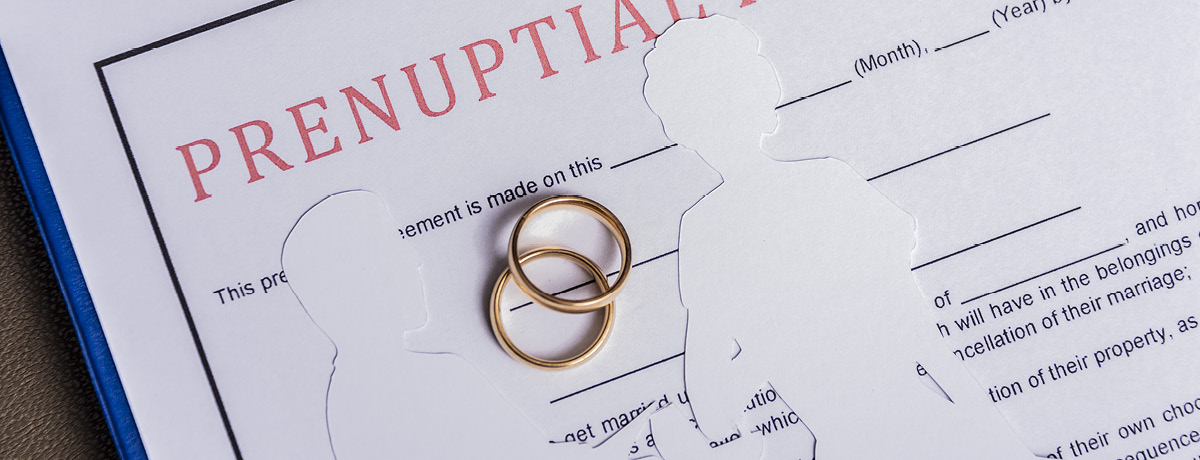Prenuptial agreements seem to be in the headlines recently. No longer the domain of celebrities and billionaires, “prenups” are becoming more popular for millennial and Generation Z couples and can serve a variety of purposes when couples decide to marry. The following article provides responses to frequently encountered inquiries regarding these agreements.
What Is a Prenuptial Agreement?
A prenuptial agreement, or “prenup,” is a contract potential spouses enter into before marriage that typically addresses property and financial matters between the couple during the marriage and after. These agreements serve as crucial safeguards, shielding assets from division during divorce, preserving family gifts and securing individual stakes in family businesses. Moreover, prenuptial agreements have emerged as powerful tools in estate planning, helping to ensure the protection of adult children's future inheritances in the event of later marriages.
While child custody and child support are issues that may come up in a divorce, prenuptial agreements are not always binding on those two issues. Rather, the courts reserve the final decision regarding them. Nevertheless, a court may consider what spouses have provided for in their prenuptial agreement when determining custody and child support during divorce proceedings. A thoughtfully crafted and executed prenuptial agreement empowers couples to navigate separation and divorce swiftly and harmoniously, averting the need for expensive and contentious legal proceedings.
What Does a Prenuptial Agreement Cover?
The agreement may address a wide range of financial issues, including property rights (such as assets, debts and real property) and alimony. When entering into a prenuptial agreement, the parties can decide to have their property rights determined by their agreement rather than the divorce court’s default rules, which vary by state. The agreement may identify each spouse’s separate property and define how to divide any property that is acquired during the marriage in the event of a divorce. Prenups also can include terms dictating alimony, including what amount, if any, would be appropriate should the marriage end.
Why Would a Couple Consider a Prenup?
There are several reasons to enter into a prenuptial agreement. First, a prenup allows parties to opt out of a state’s default rules for property division. Absent a prenuptial agreement, in general, the laws of the state in which the couple resides will define how the parties' property (assets and debts) is divided upon their divorce.
Generally, states follow one of two methods for division of property upon divorce: equitable distribution or community property. The majority of states utilize the equitable distribution standard, where marital property is divided “equitably”—which does not necessarily mean equal (i.e., 50/50 division). Rather, in applying this equitable approach, courts try to achieve a fair allocation of property based on a list of factors or guidelines set forth by state law. Examples of factors that a court may be directed to consider include the duration of the marriage and each spouse’s contribution to the marital property.
Community property is the minority approach. Only nine states currently follow this method. Under the community property approach, the presumption is that marital property is divided equally (50/50) between parties in a divorce proceeding. Depending on the circumstances of the parties involved and the state they reside in, a couple may wish to avoid the consequences of property division in a divorce without a prenup. Accordingly, a couple may enter into a prenuptial agreement whereby they write their own rules regarding division of their property that override the state law that would otherwise apply.
Second, and perhaps more importantly, a prenup is an excellent pretext for couples to have the “money conversation” prior to getting married. Many couples put that discussion off, which can lead to unwelcome surprises and marital tensions down the road. A properly drafted prenup lays out both parties’ assets and debts and helps a couple to better understand their financial circumstances at the time of the marriage.
Who Should Consider a Prenup?
Many times, couples come to the marriage table with vastly different financial profiles. In such cases, a prenup can protect the assets one spouse earned prior to the marriage. If one partner owns a business, a strong prenup can help safeguard those assets and liabilities. It also can shield one partner from considerable debt of the other.
For couples marrying for a second or third time, the agreement can preserve assets from a previous marriage, as well as save time litigating financial issues should the new union also dissolve. As mentioned before, prenups further delineate asset and debt ownership if the state’s laws are nebulous. Look at these agreements as tools for couples to better control and protect their individual and marital property.
What to Consider with a Prenup?
Couples should thoroughly contemplate prenuptial agreements; nevertheless, it is imperative for couples to bear in mind the following aspects.
- Have the “money conversation” with your partner early, perhaps even before becoming engaged. Regardless of whether you ultimately enter into an agreement, clear communication over combining assets and debt—or not—is essential for a healthy marriage.
- Ensure full and complete disclosure of each spouse’s financial circumstances at the time of entering into the prenup, which includes—but is not limited to—his or her assets, debts and income. If the parties are not honest and fail to disclose relevant financial information, it could lead to serious issues during the enforcement stage.
- Keep in mind the disclosure of non-financial information, too. One spouse’s misconduct or infidelity could later be raised as a purported basis for invalidating the agreement. For example, one might argue that he or she was fraudulently induced to enter into the prenup due to his or her spouse’s failure to disclose a concurrent romantic relationship with another during the prenup negotiation process. To avoid this situation, consider incorporating language into your prenup whereby each party agrees that conduct, fault evidence and the causes of separation are irrelevant.
- Couples may need to acknowledge the emotional aspects of discussing a prenup and approach the process with empathy, understanding and transparency.
- Customize the prenup to address specific needs and concerns, considering individual circumstances and future contingencies.
- Seek independent legal advice for both parties to understand their rights and obligations, as well as the implications of the agreement.
Ultimately, family law attorneys will stress that a prenuptial agreement should serve as a tool for clarity, protection and fair resolution, rather than a source of conflict or distrust between partners.

Alexis Connors is an associate at Boyd Collar Nolen Tuggle & Roddenbery in Atlanta, Georgia. She focuses on family law matters, including complex divorce litigation, child support and custody disputes, and paternity and legitimization. Alexis adeptly guides clients through the intricate divorce process, offering tailored services and a commitment to achieving optimal outcomes. Her advocacy for clients is balanced with a focus on pursuing negotiated settlements, prioritizing efficiency and confidentiality.

































